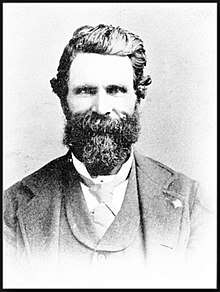Lamar Fontaine
Lamar Fontaine (October 10, 1829 - October 1, 1921) was an American military officer, spy, surveyor, poet and author. He served in the Mexican–American War and the American Civil War, and he was a member of the Ku Klux Klan. He drew maps of Israel, Japan and China. He authored poetry and a memoir.
Lamar Fontaine | |
|---|---|
 | |
| Born | October 10, 1829 Washington County, Texas, U.S. |
| Died | October 1, 1921 Lyon, Mississippi, U.S. |
| Children | 3 sons, 3 daughters |
| Military career | |
| Allegiance | |
| Service/ | United States Navy Confederate States Army |
| Years of service | 1846–1848 1861–1865 |
| Rank | Major (CSA) |
Early life
Fontaine was born on October 10, 1829 in Washington County, Texas, near Gay Hill.[1][2] He had a half brother, Reverend P. H. Fontaine, who became a Methodist minister.[1]
At the age of 10, Fontaine ran away from school in Austin and was captured by the Comanche; he was released four years later.[2][3] He attended school in North Carolina.[2]
Career
Fontaine joined the United States Navy and served in the Mexican–American War of 1846–1848, including the Siege of Veracruz.[1][2]
Fontaine first worked as a surveyor for the Yazoo and Mississippi Valley Railroad.[3] He explored the Amazon River with William Lewis Herndon as well as Israel (then known as Palestine), where he helped draw maps.[1][2] He drew maps of Russia and sketches of the Great Wall of China.[1] He traveled to Japan with Matthew C. Perry, and he "was instrumental in ridding the seas of the Malay pirates."[1][2] His autobiography states he participated in the Crimean War.[4]
Fontaine joined the Confederate States Army during the American Civil War of 1861–1865.[2] He served under generals Stonewall Jackson and Robert E. Lee.[2] He became a Major on July 28, 1863.[2] He took part in the Battle of Mine Run and the Battle of Bloody Angle.[2] He was a dispatch bearer at the Siege of Vicksburg.[5][6] His autobiography states that he was responsible for sinking the famed cannon "Whistling Dick" in the Mississippi River to prevent it falling into Union hands.[4] He said that he was wounded 67 times during the war.[1] In an 1892 letter, he said that he had been with the 2nd Virginia Cavalry, Company I.[6] An article in America's Civil War says that he was a spy with the Mississippi infantry.[7]
During the Reconstruction era, he joined the Ku Klux Klan chapter in Hinds County and Madison County.[8] An essay he wrote about the Klan was also published in The Ku Klux Klan or Invisible Empire by Mrs S. E. F. Rose.[8] He is quoted as writing, "In the courts of this invisible, silent, and mighty empire, there were no hung juries, no laws delayed, no reversals, on senseless technicalities by any Supreme Court, because from its Court there was no appeal, and punishment was sure and swift, because there was no executive to pardon."[8]
Fontaine authored several books.[9] He composed poems, like Oenore, Only a Soldier or Dying Prisoner in Camp Chase, and claimed to have written All Quiet Along the Potomac Tonight.[1][6] He published his memoir, My Life and My Lectures.[1] Another book was about the Ku Klux Klan: The Cause and the Effect of the Ku Klux Klan in the South.[1]
Personal life and death
Fontaine married Miss Brickell;[9] they had three sons and three daughters.[1] They resided in Lyon, Mississippi.[1]
Fontaine died on October 1, 1921 in Lyon, Mississippi, at 92.[1][2][10]
Works
- Lamar Fontaine (1908). My Life and My Lectures. Neale Publishing Company.
References
- "Lamar Fontaine Warrior, Poet Dead At 92". Tensas Gazette. Saint Joseph, Louisiana. October 7, 1921. p. 2. Retrieved May 6, 2018 – via Newspapers.com.
- "Funeral Service of Major Lamar Fontaine. Some of the Interesting Features of a Very Noble Career". Jackson Daily News. Jackson, Mississippi. October 3, 1921. p. 6. Retrieved May 6, 2018 – via Newspapers.com.
- "Major Fontaine Dead". The Sunflower Tocsin. Indianola, Mississippi. October 6, 1921. p. 1. Retrieved May 6, 2018 – via Newspapers.com.
- Lamar Fontaine (1908). My Life and My Lectures. Neale Publishing Company.
- Leading Participants North and South (1 April 2004). Annals of the War. Kessinger Publishing. p. 123. ISBN 978-1-4179-0387-0.
- "Lamar Fontaine to Mary C. Day re: his ballad "All Quiet along the Potomac tonight"". Gilder Lehrman Institute of American History. Retrieved 27 January 2019.
- McClure, Robert L. (May 2003). "Lamar Fontaine floated through Mississippi swamps to bring percussion caps to Vicksburg". America's Civil War. 16 (2). Ebsco.
- Rose, Laura Martin (1914). The Ku Klux Klan or Invisible Empire. New Orleans, Louisiana: L. Graham co. pp. 55, 73 – via Internet Archive.
- "Maj. Lamar Fontaine Passed Away At Lyons. Was a Former Resident of Yazoo County--Well-Known Throughout the State". The Yazoo Herald. Yazoo City, Mississippi. October 4, 1921. p. 1. Retrieved May 6, 2018 – via Newspapers.com.
- "The Passing of a Great Confederate". The Aberdeen Weekly. Aberdeen, Mississippi. October 7, 1921. p. 4. Retrieved May 6, 2018 – via Newspapers.com.
External links